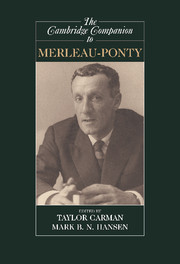Book contents
- Frontmatter
- Introduction
- 1 Merleau-Ponty and the Epistemological Picture
- 2 Sensation, Judgment, and the Phenomenal Field
- 3 Seeing Things in Merleau-Ponty
- 4 Motives, Reasons, and Causes
- 5 Merleau-Ponty and Recent Cognitive Science
- 6 The Silent, Limping Body of Philosophy
- 7 Merleau-Ponty and the Touch of Malebranche
- 8 A Phenomenology of Life
- 9 The Embryology of the (In)visible
- 10 Merleau-Ponty’s Existential Conception of Science
- 11 Between Philosophy and Art
- 12 Understanding the Engaged Philosopher: On Politics, Philosophy, and Art
- 13 Thinking Politics
- References
- Index
8 - A Phenomenology of Life
Published online by Cambridge University Press: 28 May 2006
- Frontmatter
- Introduction
- 1 Merleau-Ponty and the Epistemological Picture
- 2 Sensation, Judgment, and the Phenomenal Field
- 3 Seeing Things in Merleau-Ponty
- 4 Motives, Reasons, and Causes
- 5 Merleau-Ponty and Recent Cognitive Science
- 6 The Silent, Limping Body of Philosophy
- 7 Merleau-Ponty and the Touch of Malebranche
- 8 A Phenomenology of Life
- 9 The Embryology of the (In)visible
- 10 Merleau-Ponty’s Existential Conception of Science
- 11 Between Philosophy and Art
- 12 Understanding the Engaged Philosopher: On Politics, Philosophy, and Art
- 13 Thinking Politics
- References
- Index
Summary
I would like to begin with a passage from Derrida's Speech and Phenomena. It concerns the parallel Husserl establishes between phenomenological psychology and transcendental phenomenology. For Husserl, the domain of pure psychological experience has the same scope as the whole domain of transcendental experience. There is, however, an irreducible difference between these two fields inasmuch as the domain of phenomenological psychology refers to the subject as part of the world, that is, as existing empirically, whereas transcendental phenomenology concerns a consciousness that is not threatened by the destruction of the world and that is therefore the condition of the possibility of the world qua phenomenon.
This is why Derrida writes that this irreducible difference between transcendental and empirical consciousness is nonetheless “nothing.” For in fact nothing – at any rate, nothing that can be defined in the natural or ontical sense – distinguishes transcendental from empirical consciousness. Yet they can in no way be conflated. So, the notion of a parallel, used by Husserl, is indeed apt because two parallel lines are identical; they are no different geometrically, yet they are not the same line. Like parallel lines, empirical and transcendental consciousness are at once very near and very far from one another.
- Type
- Chapter
- Information
- The Cambridge Companion to Merleau-Ponty , pp. 206 - 230Publisher: Cambridge University PressPrint publication year: 2004
- 2
- Cited by



